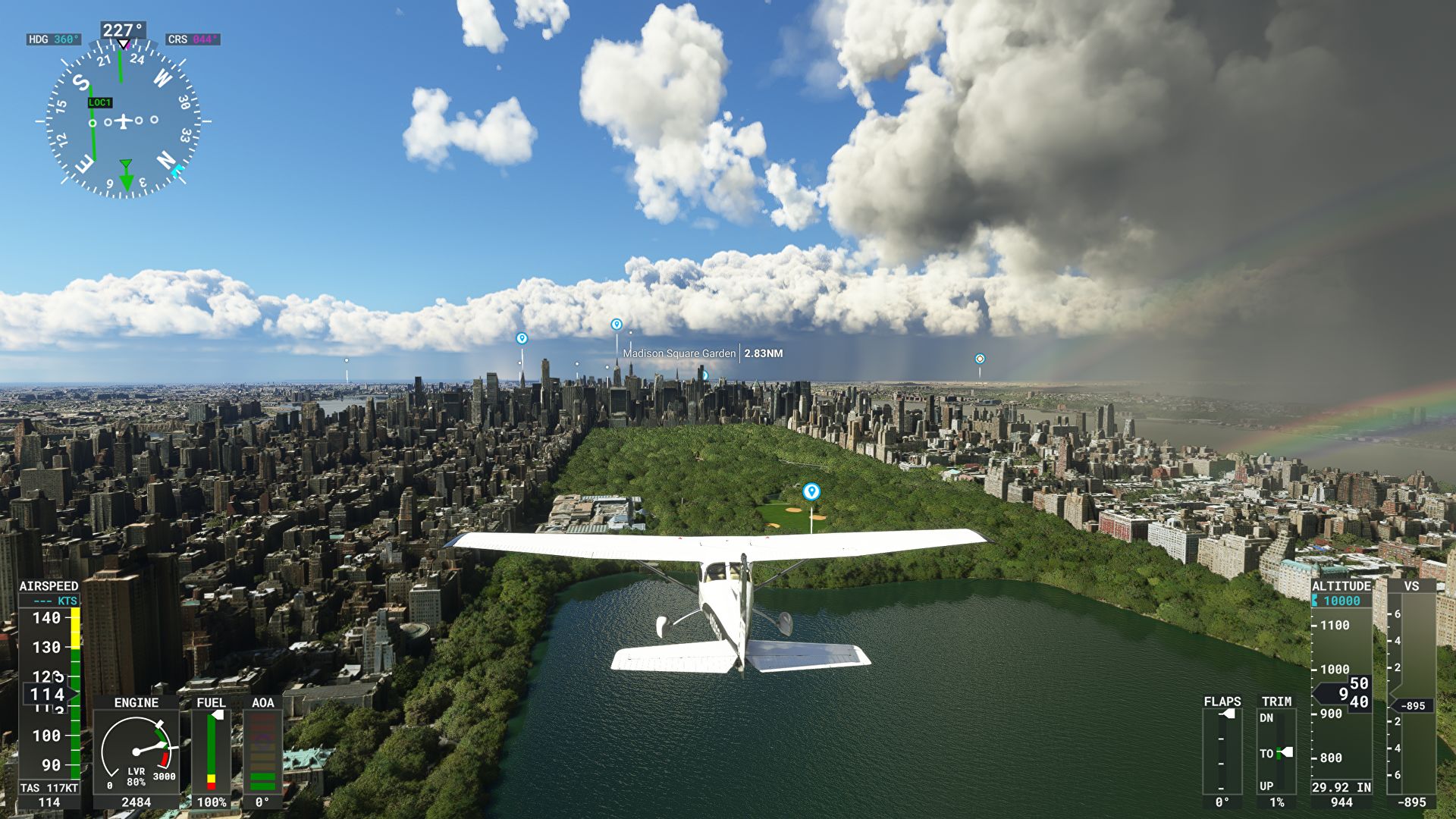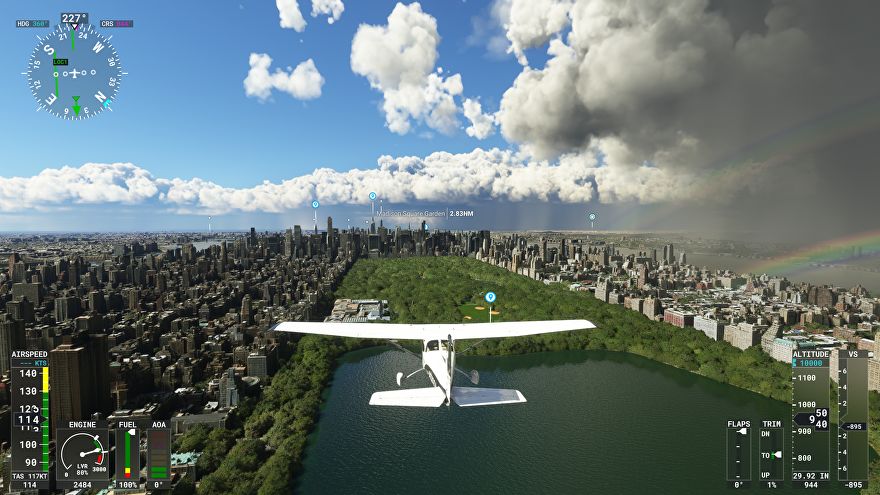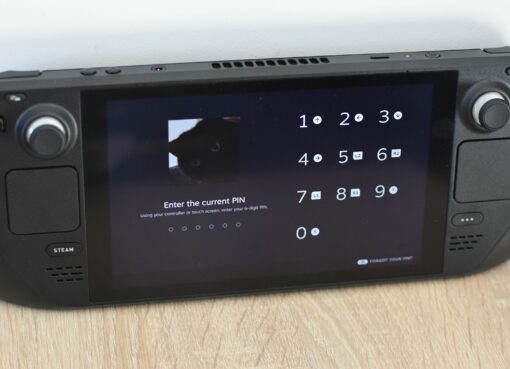If you click on a link and make a purchase we may receive a small commission.
Read our editorial policy.
Even with a bunch of post-launch performance improvements, Microsoft Flight Simulator is still the kind of game that can make most PCs sweat. Good news, then, for frequent flyers who happen to own an Nvidia GeForce RTX graphics card: Flight Sim is getting DLSS support this year.
Specifically, DLSS will be available when running the sim in DirectX 12, as part of a handful of upcoming DX12 enhancements that also include optimisations for playing on multiple monitors. Developers Asobo Studio confirmed the DLSS addition in a recent devstream, which you can watch in full below, though the feature is still being tested so there’s no specific date beyond 2022.
Unlike AMD FSR, or Intel’s upcoming XeSS, Nvidia’s upscaling tech is very picky about which GPUs it associates with. You basically need one the best graphics cards from Nvidia’s own stable (i.e. the RTX 20 series and RTX 30 series) to enable it. Still, it is currently the best of all the available upscaling tech, using its added AI smarts and built-in anti-aliasing to produce a cleaner, sharper image than FSR.
Asobo’s DLSS implementation is still in the works, though CEO Sebastian Wloch said in the video Q&A that the prototype “works much better than we thought.” Which is, er, reassuring.
I myself wouldn’t say no to a spot of DLSS; during my recent attempts to learn Flight Simulator’s fastidious ways, even my RTX 3090 was feeling the heat of all the city-scale hyperdetail at 1440p. If DLSS can deliver the native-level sharpness and meaty performance boost it has done in plenty of other games, it could easily be one to add to the pre-flight checks.
We’re keeping a full list of all games with DLSS and ray tracing support for your perusing pleasure – just remember you’ll need an RTX 20 series or RTX 30 series card to enable DLSS where it’s available. If your PC is struggling to perform in a game that lacks both DLSS and FSR support, or you have a non-RTX card, you could try Nvidia Image Scaling instead.
Bringing you the latest news and reviews for games on Steam!
- Steam Gamer
- Steam Gamer
- Steam Gamer
- Steam Gamer
- Steam Gamer
- Steam Gamer
- Steam Gamer
- Steam Gamer
- Steam Gamer
- Steam Gamer
- Steam Gamer
- Steam Gamer
- Steam Gamer
- Steam Gamer
- Steam Gamer
- Steam Gamer
- Steam Gamer
- Steam Gamer
- Steam Gamer
- Steam Gamer
- Steam Gamer
- Steam Gamer
- Steam Gamer
- Steam Gamer
- Steam Gamer
- Steam Gamer
- Steam Gamer
- Steam Gamer
- Steam Gamer
- Steam Gamer
- Steam Gamer
- Steam Gamer
- Steam Gamer
- Steam Gamer
- Steam Gamer
- Steam Gamer
- Steam Gamer
- Steam Gamer
- Steam Gamer
- Steam Gamer
- Steam Gamer
- Steam Gamer
- Steam Gamer
- Steam Gamer
- Steam Gamer
- Steam Gamer
- Steam Gamer
- Steam Gamer
- Steam Gamer
- Steam Gamer
- Steam Gamer
- Steam Gamer
- Steam Gamer
- Steam Gamer
- Steam Gamer
- Steam Gamer
- Steam Gamer
- Steam Gamer
- Steam Gamer
- Steam Gamer
- Steam Gamer
- Steam Gamer
- Steam Gamer
- Steam Gamer
- Steam Gamer
- Steam Gamer
- Steam Gamer
- Steam Gamer
- Steam Gamer
- Steam Gamer
- Steam Gamer
- Steam Gamer
- Steam Gamer
- Steam Gamer
- Steam Gamer
- Steam Gamer
- Steam Gamer
- Steam Gamer
- Steam Gamer
- Steam Gamer
- Steam Gamer
- Steam Gamer
- Steam Gamer
- Steam Gamer
- Steam Gamer
- Steam Gamer
- Steam Gamer
- Steam Gamer
- Steam Gamer
- Steam Gamer
- Steam Gamer
- Steam Gamer
- Steam Gamer
- Steam Gamer
- Steam Gamer
- Steam Gamer
- Steam Gamer
- Steam Gamer
- Steam Gamer
- Steam Gamer
- Steam Gamer
- Steam Gamer
- Steam Gamer
- Steam Gamer
- Steam Gamer
- Steam Gamer
- Steam Gamer
- Steam Gamer
- Steam Gamer
- Steam Gamer
- Steam Gamer
- Steam Gamer
- Steam Gamer
- Steam Gamer
- Steam Gamer
- Steam Gamer
- Steam Gamer
- Steam Gamer
- Steam Gamer
- Steam Gamer
- Steam Gamer
- Steam Gamer
- Steam Gamer
- Steam Gamer
- Steam Gamer
- Steam Gamer
- Steam Gamer
- Steam Gamer
- Steam Gamer
- Steam Gamer
- Steam Gamer
- Steam Gamer
- Steam Gamer
- Steam Gamer
- Steam Gamer
- Steam Gamer
- Steam Gamer
- Steam Gamer
- Steam Gamer
- Steam Gamer
- Steam Gamer
- Steam Gamer
- Steam Gamer
- Steam Gamer
- Steam Gamer
- Steam Gamer
- Steam Gamer
- Steam Gamer
- Steam Gamer
- Steam Gamer
- Steam Gamer
- Steam Gamer
- Steam Gamer






Comment here